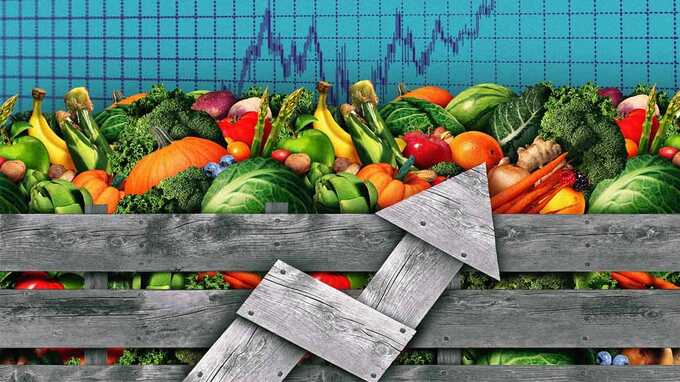Food inflation drops to lowest level in two years – but chocolate hits record high just before Easter
Plus two high street giants are cutting down their number of stores
Food price inflation has dropped to its lowest level for two years — but chocolate is at a record high just in time for Easter.
Figures from research group Kantar show grocery inflation eased to 4.5 per cent in March — a big drop from the 17 per cent peak this time last year.

How food inflation has changed over time
With the exception of butter, milk and loo roll, most items are still considerably more expensive than two years ago.
The lower level of inflation just means they are getting dearer less quickly.
Meanwhile Easter eggs are more expensive than they have ever been, as chocolate brands are passing on soaring cocoa prices.
Analysis for The Sun shows the rate of inflation on chocolate remains much higher than the overall food level — at 14.4 per cent.
Brits have already spent £88million on Easter goodies this year, according to Kantar.
Hot cross buns are high on the menu with 15 per cent more sold this year than last.
Shoppers in Wales (£14.17 each on average) and the north of England (£13.84) are the biggest spenders on Easter eggs.
The rising price of chocolate and the cost of living crisis means Brits are buying an average of four eggs, compared with the usual six.
Some Easter eggs are 50 per cent more expensive than last year as big firms, including Cadbury owner Mondelez and Kit Kat brand Nestle, pass on higher costs.
A Kinder Surprise Giant Egg has risen from £10 to £15 while a Lindt Gold Bunny has jumped from £2 to £3.11, according to Which?.
The price of cocoa — the main ingredient of chocolate — hit $10,000 per ton for the first time ever this week.
Harvests in West Africa were hit by bad weather and disease affecting cocoa bean trees.
Meanwhile, more than three-quarters of Brits have switched to buying cheaper groceries to cushion the blow from inflation, according to Kantar.
This has pushed up sales of own-label ranges.
Retailers are ramping up promotions to stop an exodus of shoppers to the discounters.
Upmarket grocer Ocado became the fastest-growing supermarket last month after an aggressive voucher campaign.
Ocado Retail, half-owned by Marks & Spencer, yesterday said it had grown sales by 10.6 per cent over the past three months.
Revolution’s evolution
REVOLUTION Bar is considering all survival options — including shutting a quarter of its worst-performing sites and putting itself up for sale.
The glitzy party and dining chain blamed “external challenges” for its troubles, adding it was talking to serial entrepreneur Luke Johnson, who co-founded Pizza Express, about fundraising.
It is understood to want to raise about £10million from investors, which is more than treble the company’s £3.3million valuation after its shares crashed by 50 per cent yesterday.
Revolution, which has 58 bars and 22 gastro pubs, is looking at closing 20 bars to secure funding support, according to Sky News.
Meanwhile, the UK’s second-biggest pizza chain Papa Johns announced it will close nearly a tenth of its 450 UK restaurants by mid-May as they are no longer viable.
Asos £1bn clothes mountain
SALES at Asos have slumped again by almost a fifth, as the online fashion retailer struggles to shift a clothes mountain worth about £1billion.
Asos had been overly optimistic that the pandemic’s online shopping boom would last forever — and is offering discounts of over 60 per cent to cut its stockpile to £600million by the year’s end.
A pair of £50 Topshop wedge sandals are now £17.50 and a £105 gold mini dress can be snapped up for £35.
Sales have fallen by 18 per cent in the six months to March 3 but boss Jose Antonio Ramos Calamonte said that Asos was “right-sizing stock levels” which was helping to boost cashflow.
He said its sales decline was in line with guidance and expects underlying profits of up to £60million this year.
Asos is now worth just £451million after losing 90 per cent of its value since lockdown restrictions eased.
Co-op bank axe
THE CO-operative Bank plans to axe 12 per cent of its workforce, shedding approximately 400 jobs.
The move comes after the lender reported pre-tax profits nearly halved to £71.4million, from £132.6million in 2022.
A spokesman said: “The decision has not been made lightly, and the bank will work closely with our trade union to support impacted colleagues.”
The bank, which has 50 branches, has been in talks with Coventry Building Society since last December about a potential tie-up.
Gas boss’s £8m
THE boss of British Gas owner Centrica has doubled his pay packet to £8.2million.
Chris O’Shea got a salary of £810,000, a £1.4million annual bonus and £5.9million long-term bonus as well as pension and perks in 2023.
That was almost double the £4.49million he got in 2022.
Centrica said Mr O’Shea, in charge since 2020, helped “create significant value for shareholders”.
But the energy giant’s shares were largely boosted by the war in Ukraine hiking prices.
Mr O’Shea has said it is “impossible to justify” his pay.
Read more similar news:
Comments:
comments powered by Disqus


































